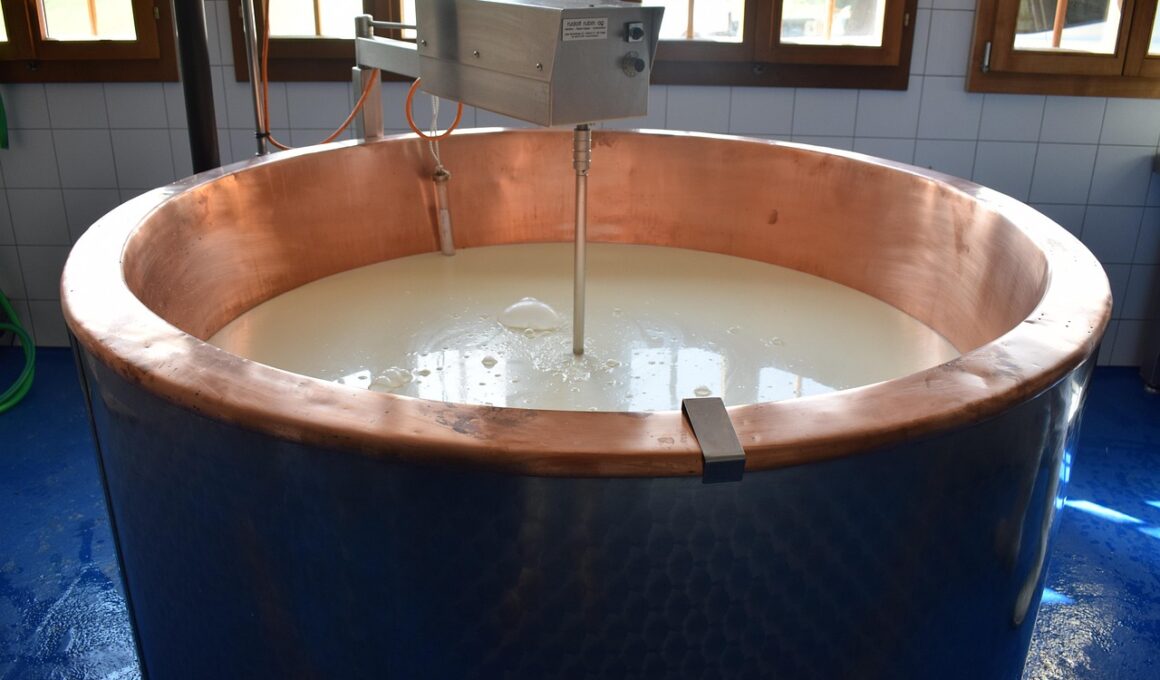Whey Protein and Hormonal Health: What You Should Know
Whey protein is a widely popular supplement among athletes and fitness enthusiasts. Its benefits include building muscle, enhancing recovery, and improving overall performance. However, whey protein also has implications for hormonal health, which is an essential aspect of an athlete’s well-being. One major component of hormonal balance is the regulation of testosterone levels, crucial for muscle growth and strength. Studies suggest that protein intake, including whey, can influence testosterone production. This influence varies between individuals and may depend on various factors, including diet and lifestyle. The amino acids in whey protein, particularly leucine, promote the synthesis of protein and may trigger hormonal responses that enhance testosterone levels. In contrast, excessive intake without proper balance can lead to adverse effects, such as hormonal imbalances. Therefore, understanding the right amounts and timing for consumption can be fundamental for optimizing these benefits while minimizing potential harms. It is essential to consult with healthcare providers or nutritionists to form a tailored approach that considers personal health needs and fitness goals.
The Role of Whey Protein in Muscle Building
Whey protein plays a crucial role in muscle synthesis and recovery. Its high biological value means it contains all essential amino acids needed for muscle repair and growth. The absorption rate is rapid, making it ideal for post-workout nutrition. Consuming protein after exercise helps to stimulate muscle protein synthesis and mitigate muscle breakdown. Various studies indicate that whey protein can enhance recovery time and improve overall strength when combined with resistance training. In addition to promoting muscle gains, whey protein can also influence hormones related to appetite and muscle mass retention. Nutritionists recommend incorporating whey protein strategically in your diet to maximize its benefits. A common approach is to consume around 20-30 grams of whey protein about 30 minutes after training for optimal results. This can complement overall protein intake throughout the day, ensuring your body has the necessary resources for muscle repair and growth. Lack of adequate protein can delay recovery time and hinder muscle development, emphasizing the importance of consistent protein consumption in fitness plans.
It’s essential to recognize that individual responses to whey protein can vary significantly. Factors such as genetics, age, and gender may play vital roles in how one metabolizes protein and experiences its benefits. For instance, younger individuals might have a different protein digestion rate compared to older populations. Moreover, women may respond differently to protein supplementation than men, particularly regarding hormone levels influenced by dietary intakes. Assessing these aspects is crucial when establishing a supplementation regimen tailored to specific needs. Consulting a healthcare provider or a dietitian can provide personalized guidance to ensure that the intake aligns with personal health objectives. Tracking how whey protein affects one’s performance and recovery is also suggested. Keeping a journal of training sessions and dietary habits allows individuals to create an informed approach to supplementation. Exploring different protein sources may also reveal preferences for types or flavors of whey, ensuring adherence to nutritional goals over time. Therefore, understanding these variables can help optimize the positive effects of whey protein and support hormonal health adequately.
Potential Risks of Excessive Protein Intake
While whey protein can be beneficial for muscle building and recovery, excessive intake can lead to potential health risks. Overconsumption of protein, beyond what the body requires, may strain the kidneys, particularly in individuals with existing renal conditions. This can result in dehydration and increased workload on the kidneys when excreting excess protein. Additionally, an imbalanced diet that relies too heavily on protein may lead to inadequate intake of essential nutrients like vitamins, minerals, and fibers. Hormonal imbalances can also arise from prolonged excessive protein intake, potentially disrupting thyroid or cortisol levels. It is crucial to aim for a balanced diet consisting of macronutrients to support overall health. Regularly alternating between whey protein and whole food sources can mitigate these risks while ensuring nutritional diversity. Ensuring an adequate caloric intake from various food groups is essential for muscle maintenance and hormonal equilibrium. Individuals should strive to meet their protein needs through whole foods complemented by whey protein rather than using it as the sole protein source.
Incorporating healthy fats and carbohydrates into a diet that includes whey protein can further enhance hormonal health. Healthy fats are vital for hormone production, particularly sex hormones like testosterone and estrogen. Foods like avocados, nuts, and olive oil can contribute to a well-rounded approach to dietary fats. Similarly, carbohydrates also play a role in an athlete’s recovery; replenishing glycogen stores post-exercise can optimize workout results and support muscle synthesis. Incorporating whole foods rich in complex carbohydrates can ensure steady energy levels, further supporting training goals. Timing meals that comprise whey protein, healthy fats, and carbs is crucial for maximizing recovery and hormonal balance post-exercise. Consuming a balanced meal around workouts can efficiently leverage nutrient absorption, thus enhancing recovery and performance outcomes. A comprehensive nutritional plan that integrates these aspects is beneficial for anyone serious about fitness and muscle-building objectives. Understanding the synergy between protein, fats, and carbohydrates is necessary for those who want to achieve their fitness goals while maintaining optimal hormonal health.
Final Considerations Regarding Whey Protein
In conclusion, whey protein can be a powerful ally in muscle building and hormonal health if used appropriately. Balance is the key, as optimal hormonal function is essential for overall wellness and performance. Individuals should focus not only on protein intake but also on total caloric intake and dietary diversity to maximize muscle-building efforts. Consulting with nutrition experts can help tailor protein intake plans concerning training regimes and personal health requirements. Addressing any underlying health conditions with professionals can also guide safe supplementation. Remember to monitor how your body responds to whey protein and adjust intake as necessary. Listening to your body can provide insights into optimal consumption levels while promoting lean muscle development. While whey protein has numerous benefits, moderation and understanding your body’s needs are paramount. Utilizing whey as part of a comprehensive nutrition strategy incorporating diverse food groups is the best approach to enhance overall health. Ultimately, a holistic view of diet and lifestyle will yield sustainable health and fitness results over time.
Whey protein represents a valuable addition to dietary practices focused on muscle building and hormonal health. When incorporated correctly, it provides various benefits that contribute to athletic performance and recovery. However, it is vital to be mindful of the individual body’s needs and responses to supplementation. Remember that while whey can aid in achieving fitness goals, a complete nutrition strategy considering macronutrient balance, hydration, and overall health is essential. In this context, defining clear fitness objectives and seeking expert guidance can keep one on track. Additionally, examining personal preferences for protein and food sources ensures a more enjoyable and sustainable approach to supplementation. Enhancing one’s fitness journey through informed dietary choices can lead to significant improvements both physically and hormonally. As new research emerges in the field, being adaptive with supplementation choices will help maintain progress and positively influence health outcomes. The ultimate purpose of including whey protein in the diet should align with one’s overall health and performance goals, paving the way for long-term successes in muscle-building endeavors.
The Importance of Proper Supplementation
To conclude, considering the importance of whey protein and its influence on hormonal health is paramount for individuals engaging in physical activities. Adopting a systematic approach to supplementation may yield the best results. This includes being aware of timing, combining sources, and ensuring a varied intake. Regular assessment of both performance and health markers supports informed decision-making on dietary and supplementation strategies. Understanding personal health and exercise routines plays a vital role when incorporating proteins like whey into one’s regimen. Acknowledging that everyone has different responses can cater to tailored advice that enhances muscle building without compromising health. Engaging with professionals and utilizing technology such as dietary tracking apps can assist individuals further in achieving individualized nutrition plans. With the right mindset and resources, people can effectively navigate the world of supplements, achieving excellence in their fitness journey while sustaining healthy hormonal profiles. Also, keeping an open dialogue with professionals ensures that any changes made can be adapted to evolving fitness needs over time. Ultimately, thoughtful integration of whey protein within a comprehensive nutrition framework can unlock exciting potential for athletic success and well-being.


